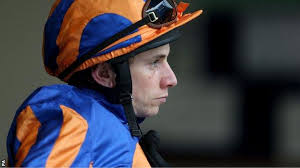Ryan Moore Persona
“The enigmatic champion of horse racing, Ryan Moore redefines sporting greatness with silence, precision, and an anti-celebrity mystique.”
HORSE RACINGPHILOSOPHY
Ed Grimshaw
9/26/20253 min read


Ryan Moore rides not only horses but contradictions. He is, in essence, the great disappearing act of modern sport: the most successful British flat jockey of his generation, and yet the least interested in playing the part of celebrity. Where Frankie Dettori somersaults into history books with the glitz of an acrobat, Moore seems to want nothing more than to evaporate into the weighing room, as though victories were private errands rather than public events. He is the monk of the paddock, the ascetic laureate of the turf, a man who has made silence into a career-defining style.
One must admire the sheer stubbornness of his anti-performance. In an age when athletes are required to be part-time jesters—tweeting slogans, grinning for sponsors, posing as lifestyle gurus—Moore is the antithesis. Asked a question, he responds with a shrug, a glance, perhaps a muttered syllable or two, as though the real conversation was always between himself and the horse, the rest of us intrusive eavesdroppers. The press, deprived of colour, portray him as dour; fans, denied theatre, call him aloof. But it is precisely this refusal that makes him magnetic. He is a cipher, and the racing world cannot resist trying to decode him.
On the track, his reticence melts into ruthless lucidity. Moore does not ride like a gambler or a showman but like a surgeon with a stopwatch. He has an uncanny instinct for timing: the ability to wait in the slipstream of chaos until the precise instant when patience becomes attack. Watching him unleash a horse in the final furlong is to watch inevitability unspool: the stillness before, the sudden eruption after, the line crossed with a kind of brutal poetry. He makes winning look less like triumph and more like mathematics—the cold solving of a furious equation.
And yet, for all his technical mastery, there is a sadness to the spectacle. Horse racing itself has receded from the national imagination; what was once a carnival of the people now limps along as a specialist’s obsession, its cultural spotlight dimmed by football’s floodlights and Formula One’s glare. Moore, in another age, would have been a household deity of the sporting pantheon. Today he is both supreme and obscure: known with reverence by insiders, but largely invisible to the wider public. He is the king of a shrinking kingdom, reigning over a sport that is itself retreating into niche.
There is also something quintessentially British in his taciturn brilliance. Where American jockeys swagger, Moore declines; where continental riders luxuriate in flair, Moore compresses himself into understatement. He is the stiff upper lip made flesh, the embodiment of a national myth that equates modesty with virtue. To his admirers, this is proof of integrity: a man too devoted to his craft to waste time on theatrics. To his detractors, it is arrogance: contempt disguised as humility. In truth, it is both. Moore is not the servant of the spectacle; he is the master of his own aloof myth.
If Dettori is remembered as racing’s entertainer, Moore will be remembered as its sphinx. He offers no stories, no gags, no public intimacy—only the relentless evidence of results. And in that minimalism lies something almost profound: a reminder that sport, at its best, needs no commentary, no branding, no choreography. It requires only the stillness of a man who knows exactly when to strike.
Thus Ryan Moore remains both presence and absence: the champion who refuses to explain himself, the genius who declines to adorn his gift with anything so vulgar as charm. His legacy will be inscribed not in his interviews but in his finishes: thousands of races decided by a man who seemed almost embarrassed by the fact of victory. And perhaps that is his final irony: that in refusing to be a star, he became something rarer—an enigma who reminds us that silence itself, handled correctly, can be louder than applause.
For Moore, the racetrack is not theatre but laboratory, and he its exacting scientist. If fans demand fireworks, he gives them equations; if the press demand poetry, he replies in blunt prose. In doing so, he exposes our own hunger for narrative, our inability to tolerate excellence without embellishment. His career is a mirror: we see in him both the greatness of mastery and the poverty of a culture that insists athletes must also be entertainers. In Moore, then, lies a parable of our time—proof that true brilliance can endure, even thrive, in silence, but also that silence itself has become so alien that we mistake it for disdain. His legend will not be built on charisma but on inevitability, and perhaps that is the purest legacy of all.
